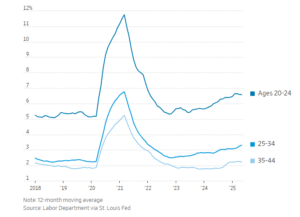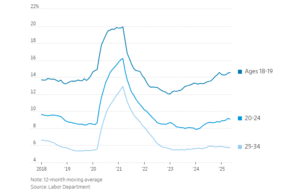
June, 2025 | Justin Lahart and Te-Ping Chen
Slow hiring is especially daunting for those just starting out; ‘Right now, I’m pretending employment doesn’t exist’
The U.S. labor market is holding steady despite extraordinary economic upheaval. But it is a bad time to be a job seeker—especially if you are young.
Recent college and high-school graduates are facing an employment crisis. The overall national unemployment rate remains around 4%, but for new college graduates looking for work, it is much higher: 6.6% over the past 12 months ending in May. That is about the highest level in a decade—excluding the pandemic unemployment spike—and up from 6% for the 12-month period a year earlier.
That rate, based on data from the Labor Department, applies to people ages 20 to 24 looking for work who have at least a bachelor’s degree. (This group is mostly people 21 to 24, since few people graduate college sooner.)
Young graduates typically face a higher unemployment rate than their counterparts who have been in the workforce longer, but the gap is growing wider between older workers and the young.
Unemployment rate by age, bachelor’s degree

Those ages 35 to 44 with bachelor’s degrees had a 2.2% unemployment rate over the past 12 months, though that was up from 1.8% over the prior period.
This follows an April report from the Federal Reserve Bank of New York saying labor-market conditions for recent college graduates “deteriorated noticeably” in the first quarter this year, even for young college graduates who have been in the workforce longer.
They found unemployment among college grads ages 22 to 27 averaged 5.8% in the first three months of this year, when President Trump’s on-again off-again tariff policies were just starting to rattle businesses and consumer confidence.
Moreover, the gap between the unemployment rate for these young graduates and the broader population became its widest in about 35 years of comparable New York Fed analysis.
The culprit, economists say, is a general slowdown in hiring. That hasn’t really hurt people who already have jobs, because layoffs, too, have remained low, but it has made it much harder for people who don’t have work to find employment. That includes everyone looking for work, but especially recent grads trying to land that first real job.
“Businesses are hunkering down, and that creates a challenge for young workers entering the labor market for the first time,” said Cory Stahle, economist at jobs site Indeed. With employers turning more cautious on hires, they are less inclined to gamble on workers with thinner résumés or skill sets, he said.

Recent Lehigh University graduate Kirby Child, 22, has spent the past several months hunting for work in fields such as health communications. She keeps running into the same challenge: Even companies filling entry-level roles are asking for three to five years of professional experience.
“I’ll think, ‘I could be good at this, but I haven’t been given a shot yet,’” said Child, who lives in Potomac, Md. “I don’t have those three to five years of experience, and it feels really hard to get that.”
Entry-level hiring has fallen by 17% since April 2019, according to data from LinkedIn. Since the pandemic, hiring has risen in healthcare, construction and education but weakened in other areas that have traditionally snapped up many college graduates, including tech and financial services, said Kory Kantenga, LinkedIn’s head of economics for the Americas.
Graduates who flocked to fields such as computer science now have far more competition just as companies are increasingly leaning on artificial intelligence to perform low-level tasks that a new employee might have done.
But a general hiring slowdown is far and away the driving force behind graduates’ often fruitless job searches, said Guy Berger, director of economic research at the Burning Glass Institute think tank. What’s more, most of the college and high-school students tossing their mortarboards into the air this month and last month aren’t even in the unemployment statistics yet. One reason the national unemployment level managed to stay low in May is that fewer people are in the workforce. That could mean frustrated job seekers stopped looking, just as more young grads are starting their searches.
Zara Anwar, Child’s friend and a fellow spring Lehigh grad, who has a bachelor’s degree in cognitive science, struggled to find employment while applying for 60 jobs. She finally received an offer this spring to work as a data analyst for a tech marketing company, but her start date has been delayed twice, most recently to August 2025. “I worry for myself. I can only hope my job actually does start in August, but I truly don’t know,” Anwar, 21, said.
The environment is even rougher for people without degrees: High-school graduates ages 18 to 19 with no college averaged an unemployment rate of 14.5% over the past 12 months. That is up from 13.3% over the prior 12-month period.
The Labor Department reported earlier this month that there were about 1.5 million fewer hires in the first four months of this year than in the first four months of last year.
Unemployment rated by age, high-school degree, no college

In Greenwich, Conn., graduating high-school senior Graydon Raabe said he has been shocked by his struggle to land a summer job. Raabe, 18, who is college-bound in the fall, has been applying since February for seasonal gigs with such employers as Home Depot, a movie theater and fast-food joints.
“My whole life, I figured if I needed a minimum-wage job, I’d apply and get one, and it wouldn’t be this hard,” Raabe said. “But it’s super difficult.”
Jack Juliana, 22, who graduated last month from Fordham University with a bachelor’s degree in finance, said he has already applied to hundreds of jobs. Many prospective employers never responded or sent him rejection notices after a matter of hours.
He recently decided to spend a few weeks backpacking in Spain before returning home to stay with his parents in Sea Girt, N.J.
“Right now, I’m pretending employment doesn’t exist,” Juliana said.
Write to Justin Lahart at Justin.Lahart@wsj.com and Te-Ping Chen at Te-ping.Chen@wsj.com
🔎Explore additional resources for breaking into CRE here: New to CRE Resources


